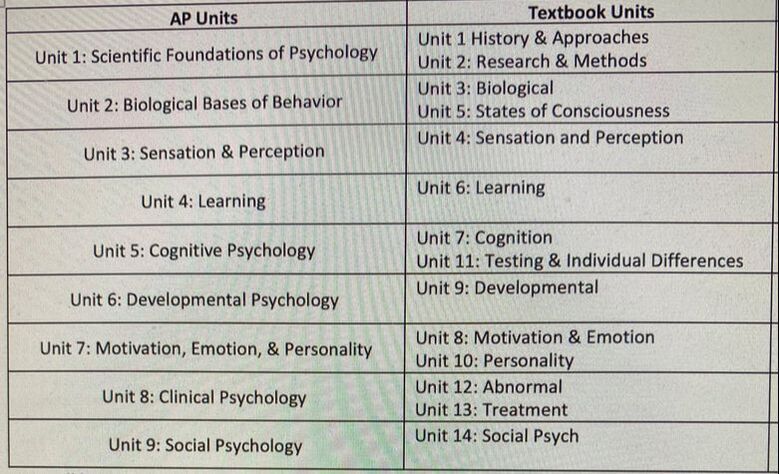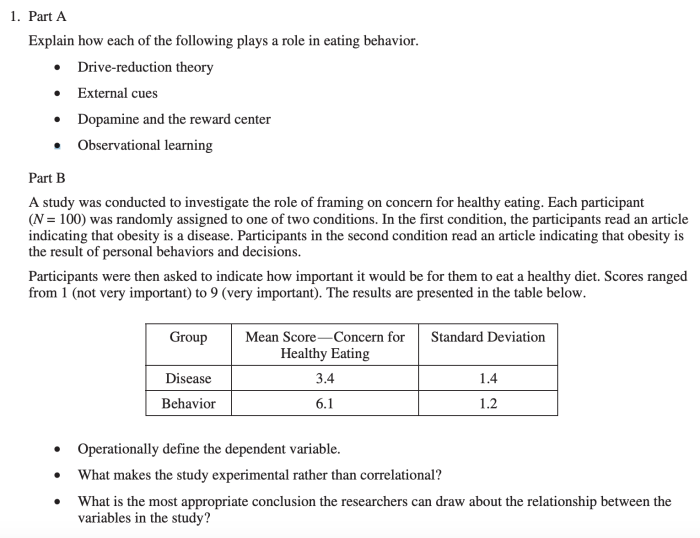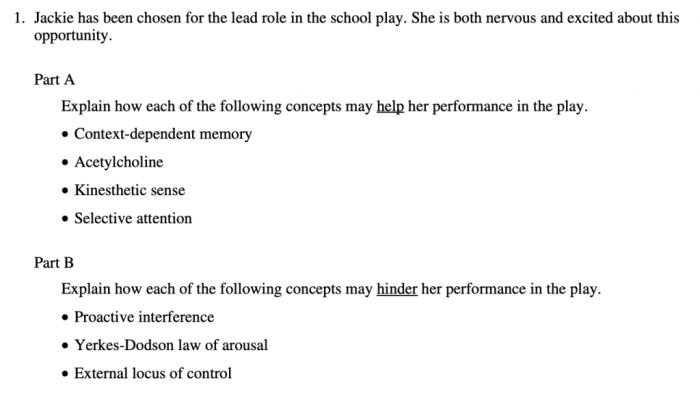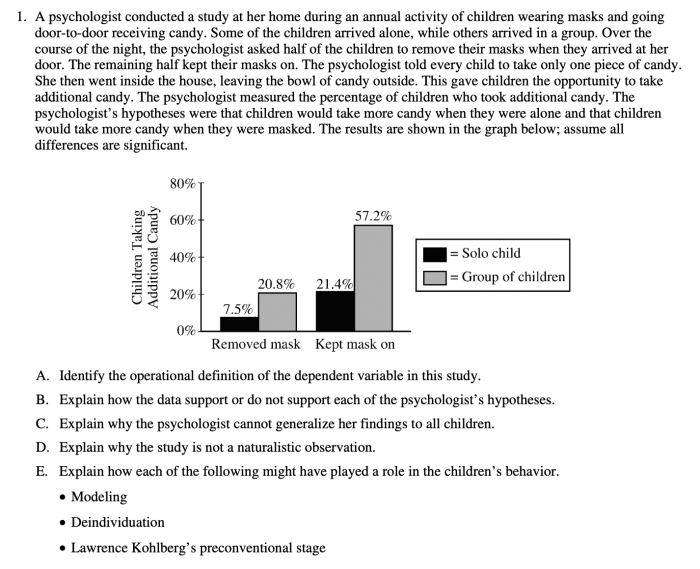AP Psychology Unit 4 FRQ: Delve into the depths of psychology’s fundamental principles and prepare to conquer the exam with confidence. This comprehensive guide will equip you with the knowledge and strategies you need to excel in this challenging assessment.
As you embark on this intellectual journey, you’ll explore key concepts, theories, and research methods that shape our understanding of human behavior. Through engaging discussions and practice questions, you’ll develop a deep comprehension of the subject matter and gain invaluable insights into the field of psychology.
Introduction

AP Psychology Unit 4 FRQ stands for Advanced Placement Psychology Unit 4 Free Response Question. It is a section of the AP Psychology exam that assesses students’ ability to apply their knowledge and understanding of psychology to real-world scenarios. The FRQ is designed to evaluate students’ critical thinking, problem-solving, and writing skills.The
FRQ is significant because it accounts for a substantial portion of the overall AP Psychology exam score. It allows students to demonstrate their proficiency in the key concepts and theories of psychology, as well as their ability to analyze and interpret psychological data.The
FRQ consists of two parts: a short answer section and a long answer section. The short answer section requires students to answer several brief questions related to a specific psychological concept or theory. The long answer section requires students to write a comprehensive essay that addresses a complex psychological issue or problem.
Key Concepts

Unit 4 of AP Psychology delves into the fundamental concepts that shape our understanding of human learning, cognition, and memory. These concepts provide the theoretical foundation for the Free Response Question (FRQ) and guide the analysis of experimental findings and real-world applications.
The key concepts covered in Unit 4 include:
- Classical conditioning
- Operant conditioning
- Cognitive learning
- Memory
Classical Conditioning
Classical conditioning, pioneered by Ivan Pavlov, examines how associations between stimuli and responses are formed. The FRQ may require candidates to describe the process of classical conditioning, explain the role of unconditioned and conditioned stimuli, and analyze experimental designs used to study this phenomenon.
Operant Conditioning
Operant conditioning, developed by B.F. Skinner, focuses on the influence of consequences on behavior. The FRQ may assess candidates’ understanding of reinforcement and punishment, schedules of reinforcement, and how operant conditioning principles are applied in real-world settings, such as education and animal training.
Cognitive Learning
Cognitive learning emphasizes the role of mental processes in acquiring knowledge and skills. The FRQ may explore theories of cognitive learning, such as schema theory, and assess candidates’ ability to apply these theories to explain how individuals organize and retrieve information.
Memory
Memory is the process of encoding, storing, and retrieving information. The FRQ may examine different types of memory, such as short-term and long-term memory, and evaluate candidates’ understanding of the factors that influence memory accuracy and retrieval.
Theories and Perspectives

Psychology is a diverse field with many different theories and perspectives. These theories and perspectives offer different ways of understanding human behavior and mental processes. In Unit 4, we will explore some of the major theories and perspectives in psychology and how they can be applied to the FRQ.
One of the most important theories in psychology is the cognitive perspective. The cognitive perspective focuses on the mental processes that underlie behavior, such as attention, memory, and problem-solving. Cognitive psychologists believe that these mental processes play a key role in determining how we think, feel, and behave.
Another important theory in psychology is the behavioral perspective. The behavioral perspective focuses on the observable behaviors of individuals and how these behaviors are influenced by the environment. Behavioral psychologists believe that we can learn a great deal about human behavior by studying how people respond to different stimuli.
The psychodynamic perspective is another major theory in psychology. The psychodynamic perspective focuses on the unconscious mind and how it influences our behavior. Psychodynamic psychologists believe that our early experiences can have a profound impact on our personality and behavior.
These are just a few of the many different theories and perspectives in psychology. Each theory and perspective offers a unique way of understanding human behavior and mental processes. In Unit 4, we will explore these theories and perspectives in more detail and see how they can be applied to the FRQ.
Applying Theories and Perspectives to the FRQ
The theories and perspectives in psychology can be applied to the FRQ in a variety of ways. For example, you can use these theories and perspectives to:
- Analyze the behavior of a character in a story or movie.
- Explain the psychological factors that contribute to a social problem.
- Develop a plan to help someone overcome a psychological challenge.
When applying theories and perspectives to the FRQ, it is important to be specific and to provide evidence to support your claims. For example, if you are using the cognitive perspective to analyze the behavior of a character in a story, you should identify the specific mental processes that are involved in the character’s behavior and provide evidence from the story to support your claims.
Examples of Applying Theories and Perspectives to the FRQ
Here are a few examples of how the theories and perspectives in psychology can be applied to the FRQ:
- Using the cognitive perspective to analyze the behavior of a character in a story who is struggling with a difficult decision.
- Using the behavioral perspective to explain the psychological factors that contribute to a social problem such as poverty.
- Using the psychodynamic perspective to develop a plan to help someone overcome a psychological challenge such as anxiety.
These are just a few examples of how the theories and perspectives in psychology can be applied to the FRQ. By understanding these theories and perspectives, you will be able to better understand human behavior and mental processes and to apply this knowledge to the FRQ.
Research Methods

Research methods are the techniques used by psychologists to collect and analyze data about human behavior and mental processes. These methods vary in their approach, design, and level of control, and each has its own strengths and weaknesses.
The choice of research method depends on the specific research question being investigated and the type of data that is needed to answer it. Some of the most common research methods used in psychology include:
Observational Methods
Observational methods involve observing and recording behavior without directly interacting with the participants. These methods can be used to study behavior in natural settings, such as in a classroom or on the playground, or in more controlled settings, such as in a laboratory.
- Naturalistic observation:Observing behavior in a natural setting without interfering with the participants.
- Participant observation:Observing behavior while participating in the activity being studied.
- Structured observation:Observing behavior using a specific set of categories or criteria.
Experimental Methods
Experimental methods involve manipulating one or more independent variables to see how they affect a dependent variable. These methods allow researchers to establish cause-and-effect relationships between variables.
- Laboratory experiment:Conducted in a controlled setting where the researcher manipulates the independent variable and measures the dependent variable.
- Field experiment:Conducted in a natural setting where the researcher manipulates the independent variable and measures the dependent variable.
Correlational Methods
Correlational methods involve measuring the relationship between two or more variables without manipulating either variable. These methods can be used to identify relationships between variables, but they cannot establish cause-and-effect relationships.
- Correlation coefficient:A statistical measure of the relationship between two variables.
- Scatterplot:A graph that shows the relationship between two variables.
Other Methods
In addition to the methods listed above, there are a number of other research methods that can be used in psychology, including:
- Case studies:In-depth studies of individual cases.
- Interviews:Asking participants questions about their thoughts, feelings, and experiences.
- Surveys:Collecting data from a large number of participants using questionnaires.
The choice of research method depends on the specific research question being investigated and the type of data that is needed to answer it. By carefully selecting the appropriate research method, psychologists can gain valuable insights into human behavior and mental processes.
Applications: Ap Psychology Unit 4 Frq
Psychology has a wide range of applications in the real world. The concepts, theories, and research methods covered in Unit 4 can be used to solve problems in various fields, including education, healthcare, business, and social policy.
For example, research on learning and memory can be used to develop more effective teaching methods. Research on motivation and emotion can be used to design workplace environments that promote productivity and well-being. Research on social psychology can be used to reduce prejudice and discrimination.
Testing Applications on the FRQ
On the FRQ, students may be asked to apply the concepts, theories, and research methods covered in Unit 4 to solve real-world problems. For example, students may be asked to:
- Design a research study to investigate the effects of a new teaching method on student learning.
- Develop a training program to improve employee motivation.
- Propose a public policy to reduce prejudice and discrimination.
Practice Questions

Practice questions are essential for honing your skills in answering the FRQ. These questions mimic the format and complexity of the actual exam, allowing you to test your understanding and identify areas for improvement.
To approach these questions effectively, it’s crucial to:
- Read the question carefully and identify the key concepts and terms.
- Brainstorm relevant theories, research methods, and applications.
- Organize your thoughts and structure your response logically.
- Provide specific examples and evidence to support your claims.
Common Pitfalls
- Lack of focus and organization.
- Repetition of information without elaboration.
- Insufficient evidence and examples.
- Ignoring or misunderstanding key terms.
- Rushing through the question without proper planning.
Study Strategies

Effective study strategies are essential for preparing for the FRQ. Understanding the key concepts, theories, and research methods is crucial. This foundation enables you to organize and synthesize information effectively.
AP Psychology Unit 4 FRQ requires students to analyze and interpret research findings. To enhance their understanding, it’s helpful to connect the concepts to real-world examples. One such example is the study on language development, as seen in a omar lo llama su tía.
By examining the linguistic patterns in a child’s speech, researchers gain insights into the cognitive and social processes underlying language acquisition. This type of research informs the content covered in AP Psychology Unit 4 FRQ, allowing students to apply their knowledge to practical scenarios.
Understanding Key Concepts, Theories, and Research Methods
Thoroughly comprehend the core concepts, theories, and research methods in each unit. This forms the basis for answering the FRQ accurately and comprehensively.
Organizing and Synthesizing Information
- Create Artikels:Construct detailed Artikels to organize the key concepts and theories. This helps structure your understanding and facilitates easy retrieval.
- Use Mind Maps:Create visual representations of the interconnected concepts using mind maps. This enhances comprehension and aids in recalling information.
- Summarize and Paraphrase:Practice summarizing and paraphrasing the material to reinforce understanding and improve retention.
Conclusion
In conclusion, the FRQ in AP Psychology is a crucial component of the exam that assesses students’ comprehensive understanding of the subject matter. It requires students to demonstrate their knowledge, analytical skills, and ability to synthesize information from various perspectives.
By thoroughly preparing for the FRQ, students can not only improve their chances of success on the exam but also gain valuable skills that will serve them well in their future studies and careers.
Importance of the FRQ, Ap psychology unit 4 frq
- Assesses higher-order thinking skills, such as analysis, synthesis, and evaluation.
- Provides students with an opportunity to demonstrate their understanding of key concepts and theories.
- Prepares students for college-level writing and research.
- Contributes significantly to the overall AP Psychology exam score.
Encouragement for Students
As you continue your studies in AP Psychology, remember to focus on developing a deep understanding of the subject matter. Engage with the material, participate in class discussions, and seek clarification when needed. By putting in the effort now, you will be well-prepared for the challenges of the FRQ and the AP Psychology exam as a whole.
Best of luck in your studies!
Clarifying Questions
What is the purpose of the AP Psychology Unit 4 FRQ?
The FRQ (Free Response Question) assesses your ability to apply your knowledge of psychology to real-world scenarios and demonstrate your critical thinking and analytical skills.
How should I approach the FRQ?
Read the question carefully, identify the key concepts being tested, and organize your thoughts before writing. Support your arguments with specific examples and evidence from the course material.
What are some common pitfalls to avoid when answering the FRQ?
Avoid vague or overly general responses. Provide specific examples and evidence to support your claims. Ensure your writing is clear, concise, and well-organized.